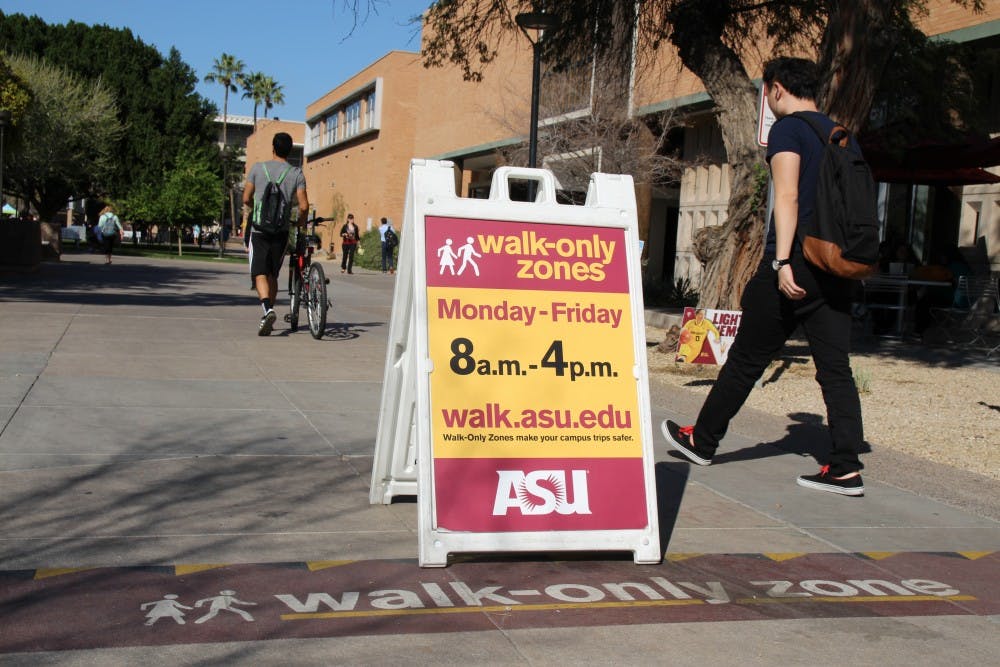Walk-Only Zones have been a highlighted aspect on campus in the last two years. Whether students express their appreciation for safety or their annoyance of inconvenience, there is no denying their presence on campus. However, the students who chose to be ambassadors have a unique perspective on the purpose and goals of the Walk-Only Zones.
Political science and philosophy junior Austin Woods has been with the Walk-Only Zone program since its beginning. He has experienced navigating the campus with and without Walk-Only Zones, and says he now understands how much of a positive safety impact they have.
"I do remember my freshman year when I was going through and there was always a truck going down Tyler Mall and it was always a problem," Woods says. "Palm Walk obviously was even worse because if one cart decided that was a shortcut then everyone could not get around them."
Since taking this job two years ago, Woods has had some memorable experiences with students who have expressed gratitude for the Walk-Only Zones. According to Woods, this is one of the most rewarding parts of this position.
"One time I was standing near the MU working and there was a student trying to get to class who was visually impaired, so I tried to help him," Woods says. "He told me that before the Walk-Only Zones, he was in fear of getting hit because he would constantly hear carts and bikes and not know where they were going, but because we have expanded so much, he has a way to get to class without having to worry about that."
Woods believes that since implementing the Walk-Only Zones, traveling has become simpler and easier. Even if people do prefer to use their bikes and skateboards, he notes that it is more convenient to go around the Walk-Only Zones where the wider sidewalks are more conducive for alternative transportation. However, all Walk-Only Zone employees are trained with high customer service standards to deal with students who do not always comply.
"We're trained to be as polite as possible, like any customer service job, because people might be angry but rising to their level isn't the best plan," nutrition junior Cassaundra Kinnear says, who has been with the Walk-Only Zone program for two years. "We try to be as kind as possible to everyone."
Since Kinnear was hired as a freshman, she has only experienced the campus with Walk-Only Zones. As an employee, she has found that most of the student body knows that she is just trying to do her job by helping the ASU community as much as she can.
"I personally prefer to walk in the Walk-Only Zones because I don't have to feel like I'm constantly checking and making sure that someone's not behind me or that I'm going to run into someone when I'm just trying to walk to class," Kinnear says.
Kinnear and Woods both agree that the most rewarding part of the position is hearing the comments from students and staff who say that they feel safer in the Walk-Only Zones.
"I've had people tell me that they just had a close encounter with someone on a bike and came to the Walk-Only Zone to feel safer," Kinnear says. "One time I had a student who started riding in the zone and gave him the, 'Excuse me sir, this is a Walk-Only Zone!' and he got off and yelled to me, 'Wow, you were just being so nice I had to get off my bike.'"
When it comes to the job, the most effective way to handle students who ride in the Walk-Only Zones is to maintain a polite demeanor at all times. Both Woods and Kinnear advocate the safety message of the Walk-Only Zones, and feel the most accomplished when students feel the impact personally.
"The Walk-Only Zones are to promote safety and also to redirect the flow of traffic," Woods says. "I feel like the best way to advocate is to talk to my friends so I can have a deeper conversation with them and tell them what the Walk-Only Zones do and how it helps ASU."
Reach the writer at ablight@asu.edu or on Twitter @alysse_sky.




